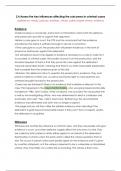2.4 Assess the key influences affecting the outcomes in criminal cases
-preference- media, judiciary, barristers, witness, politics expert witness, evidence
Evidence
-Evidence plays a crucial role, and is facts or information which both the defence
and prosecution provide to support their argument.
-Before a case goes to court, the CPS must be convinced that the evidence
provided by the police is sufficient enough to secure a conviction.
-If the case goes to court, the prosecution will present evidence, in the form of
physical or testimonial, against the defendant.
-The standard of proof is the degree of evidence necessary to a case in order for it
to succeed. In criminal cases, the burden of proof is on the prosecution, and the
standard required of them is that they prove the case against the defendant
‘beyond reasonable doubt’ meaning that there is no other reasonable explanation
that is possible from the evidence given at the trial.
-Whereas, the defence's role is to question the prosecution's evidence. They must
present evidence of their own, as well as having the right to cross-examine any
witnesses brought forward by the prosecution.
-Cases may be dismissed if there is no evidence that is reliable or relevant to the
case. This happened in the case of Anita Cobby, who was gang raped and brutally
murdered in 1986. John Cobby, Anita’s husband, was accused. He was pushed into
a wall by the investigating officer, who was determined to elicit a confession and
eventually John said, "Yep. I did it. Must have." Before long, this circumstantial
evidence was eliminated and John was no longer a suspect.
-The judge and jury will then utilise the reliable evidence when deciding if the
defendant is guilty beyond reasonable doubt. If they can’t form a majority verdict,
the defendant is acquitted.
Witnesses
Witnesses are another key influence in criminal cases, and they are people who give
evidence in court, and when believed, largely affect the outcome of a trial. They
are called by both parties to testify either against or on behalf of the defendant.
Examination-in-chief is when the party which called the witness questions them in
trial. This occurs in person unless both parties agree on the evidence and it is given
by a written statement, or if the witness is deemed to be a vulnerable or intimidated
witness, they may testify via a video link or recording. The witness is then cross-
, examined by the opposing side in order to try to discover any inconsistencies in their
story.
In the case of William Roache, who was accused of 5 sexual assault 40 years ago,
the witness provided inconsistent testimonies which were criticised by the barristers.
When the alleged victim was recalled to give evidence, the prosecution casted
doubt on the testimony as she couldn't remember details about the cottage where
the alleged rape occured. In addition, there was no contemptuous evidence to
show how Roache had met the accusers resulting in Roache being found not guilty
of all charges due to the unreliability of evidence and witnesses.
Stereotyping, both racial and gender prejudices, may affect whether a witness
statement is believed by jurors. This was found in research conducted by Kaufmann
et al who found that the credibility of rape victims story largley depended on their
emotion during the testimony, rather than the details they provided. Further research
by Brodsky et al discovered that the jurors' opinion of the witness's knowledge,
likeability, trustworthiness and confidence influences whether they believe them.
Eye witness testimonies are heavily scrutinised for their inaccuracy, and the
Innocence Project discovered that in 70% of 352 wrongful convictions, the main form
of evidence utilised was eye-witness testimonies. The accuracy of eyewitness
testimonies can be questioned in the case of Troy Davis, who was accused of
shooting a police officer and assaulting a homeless man. The case against Davis
was built entirely on eyewitness testimonies, however these testimonies, all but two,
were later altered. The witnesses said their testimony was influenced by police
coercion into accusing Davis. Davis was given the death penalty, despite serious
doubts of his guilt. Therefore, although eyewitness testimony may have a key
influence on the outcome of criminal cases, they may cause severe miscarriages of
justice if their accounts are biased.
Expert Witnesses
An expert is someone with specialised knowledge who has extensive training in a
particular area, and they are called into cases on behalf of the prosecution and
defence. They are not legal professionals but can provide technical evidence
Their evidence tends to include statistics and technical terms which further embeds
the idea that what they are saying is correct and true. However, this may be a risk
because they are professionals in their field so the judge or jury may believe them
automatically, and their opinion then becomes biased.




